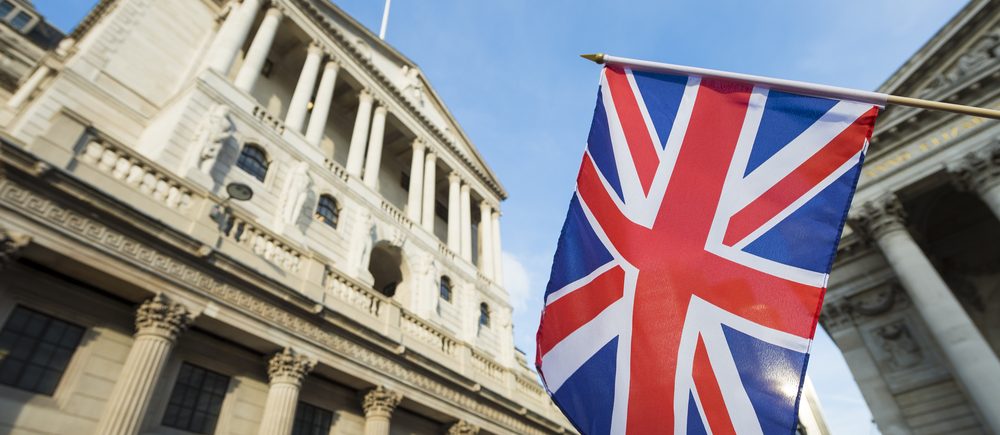The Bank of England is almost certain to increase borrowing costs on Thursday, marking the third consecutive meeting where it has hiked rate as it continues its exit from pandemic-related stimulus. One problem is that BoE hike expectations are not happening in a vacuum or in isolation.
Other Developed Market central banks edging closer to their own hiking cycle, for example US Fed also likely hiking this month, means hawkish pricing remains the path of least resistance. Sterling rate markets are in a different position than their dollar peers, however. The BoE has already hiked twice, so the ‘pre-emptive’ part of its tightening is already well underway, and markets are thus more likely to pay attention to the growth risk of higher energy prices.
As is the case with most central banks, the BoE slashed interest rates to a record low as the coronavirus swept across the world but is now facing soaring inflation, which reached a near 30-year high of 5.5% in January which is likely to surge further.
BoE has been the first major central bank to hike rates since the pandemic began. The US Fed is widely expected to act on Wednesday and last week the European Central Bank paved the way for an increase later this year.
BoE’s policymakers are expected to add another 25 basis points to Rate on Thursday, taking it to 0.75% – its pre-pandemic level, according to 44 of 49 economists polled by Reuters March 10-14. The other five said there would be no change.
The British economy grew much faster than expected, expanding 0.8% in January, but Russia’s invasion of Ukraine has injected more uncertainty in a climate where high inflation had already made a difficult path for the Bank to negotiate.
The economic consequences of the war in Ukraine have worsened the already tricky mix between soaring inflation and slowing GDP growth. BoE is expected to follow up this week’s increase with another 25 basis point rise next quarter and a matching increase in Q3.
It will then hike Bank Rate to 1.50% early next year, although that rate was picked by 15 of 44 economists while 21 saw it lower and eight higher. In February it was not expected to reach the said level until 2024.
Four of the nine policymakers voted for a 50-basis point hike last month but none of the economists surveyed had that as their base case for this month’s decision and only four of 18 respondents said it was a likely move this year.
Rate-setter Michael Saunders, who voted for a 50-basis point increase last month, said earlier in March he would not necessarily vote the same way again. A 50-basis point hike is very unlikely according to Goldman Sachs.
Inflation was expected to peak at 7.7% next quarter, almost four times the Bank’s 2% goal and a sharp upgrade from the 6.6% median given last month.
In contrast, growth forecasts were largely revised down. Following January’s buoyant expansion this quarter’s outlook was changed to 0.7% from 0.4% but the following quarters were all downgraded to 0.4% from last month’s 0.9%,
Annual rates were also lowered with growth now pegged at 3.9% this year and 1.7% next, down from 4.3% and 2.1%. The intensifying cost of living crisis should ultimately weigh on activity -particularly private consumption over the coming quarters. Consumer confidence is already weakening, and this, in turn, is expected to translate into weaker GDP data over the course of the year.
The Bank of England will add a third hike to its tally in this cycle. It is likely to pause and reflect once the Bank Rate reaches 1%, and gilt sales begin. Hiking expectations is excessive, an inverted yield curve reflects this, but long rates could climb further. EUR/GBP has probably seen its low this year and will rise into year-end. BoE could opt for another 25bp rate rise this week, rather than a larger 50bp move.
The war in Ukraine means that UK inflation is going to stay higher for longer. It’s likely to peak at 8% in April but could peak even higher later in year should energy prices surge higher once more.
Markets have concluded that this means BoE will double-down on its tightening plans. In the short-term investors are probably correct. So, BoE will likely hike rates for the third time this week, and probably again in May.
Policymakers have made it abundantly clear that they want to get some pre-emptive tightening done to mitigate against their concerns about higher inflation rates becoming more sustained.
While four out of nine policymakers voted for such a move back in February, the remainder of the committee indicated that they worried such a move would simply add further fuel to market interest rate expectations. Markets are pricing even more tightening than they were back then, six rate hikes in total this year. Comments from officials have offered some modest pushback against these expectations, and more will unfold on Thursday.
 Noor Trends News, Technical Analysis, Educational Tools and Recommendations
Noor Trends News, Technical Analysis, Educational Tools and Recommendations





